
Clophas Mapfumo (65) goes through an eye refraction conducted by Sister Nevanji, a refractionist for Council for the Blind based in Chiredzi, Zimbabwe. - For Peek Vision

“When I started taking my PrEP, I had an incident in 2020. The incident resulted in me being raped on my way home when I was coming from work, in the evening, by an unknown person. I saw the goodness of PrEP when I gave birth. I birthed my baby who doesn’t have the disease of HIV and AIDS and I myself did not contract the disease of HIV and AIDS. Since then, I am healthy and happy; and my baby is healthy and we are both happy.” - Nashly, sex worker. - For UNDP

Sipiwe and Chipego do dishes at the mother’s shelter in Sikachapa in Kazungula District, Zambia May 2022. - For WaterAid

Elizabeth and Constance share a moment at the arrival of Constance’s new born baby at the clinic in Sikachapa in Kazungula District, Zambia May 2022. - For WaterAid

Sipiwe plates Dorika’s hair at the mother’s shelter at Sikachapa in Kazungula District, Zambia May 2022. - For WaterAid

Community health volunteers check Jean’s weight at her home in Kilimanjaro, Zambia. Besides TB treatment and surveillance community health volunteers often conduct general health checks including HIV testing and BP checks when they visit patients at home. - For USAID

Community health volunteers speak to a woman about TB at her home in Lusaka, Zambia. - For USAID

Mailess speaks to community health volunteers about TB at her home in Kanyama, Lusaka, Zambia. - For USAID

Students around the Chimoyo community in Muzarabani fill out an assessment form before commencing the first day of the Singing to the Lions workshop at Chimoio Primary School, Zimbabwe. Singing to the Lions sessions are done with children to overcoming fear and violence in their lives. This guide is for children and youth aged eight years and older who have experienced or witnessed violence in their family, school or community. - For CAFOD

A volunteer counselor conducts a session during the Singing to the Lions workshop with students from around Chimoyo community in Muzarabani, Zimbabwe. Singing to the Lions sessions are done with children to overcoming fear and violence in their lives. Many of the participants who will take part in this workshop have experienced multiple traumas – the death of parents; military conflict; domestic violence; sexual, emotional and physical abuse; and child labor. - For CAFOD

October 28, 2021: Bitumen World workers rehabilitate Seke Road in Harare, Zimbabwe. - For IMF

September 23, 2021: People go about their business in Mbare Musika, Harare. - For IMF

Chitenderano, Nyazura, Zimbabwe - December 20, 2019: Food assistance packs ready for distribution at Chitenderano distribution point in Nyazura, in Makoni District. Zimbabwe is currently facing a severe drought caused by poor rainfall that affected harvests in 2019. The lean season assistance programme will see 49 000 food insecure people being assisted in the district. - For ActionA!d

Chitenderano, Nyazura, Zimbabwe - December 21, 2019: Community members gather to share food assistance packs amongst themselves at Chitenderano distribution point in Nyazura, in Makoni District. Zimbabwe is currently facing a severe drought caused by poor rainfall that affected harvests in 2019. The lean season assistance programme will see 49 000 food insecure people being assisted in the district.
- For ActionA!d

Chitenderano, Nyazura, Zimbabwe - December 21, 2019: Women walk home after receiving food assistance packs at Chitenderano distribution point in Nyazura, in Makoni District. Zimbabwe is currently facing a severe drought caused by poor rainfall that affected harvests in 2019. The lean season assistance programme will see 49 000 food insecure people being assisted in the district. - For ActionA!d

Chitenderano, Nyazura, Zimbabwe - December 21, 2019: Men redirect an ox-drawn cart with food assistance packs as women make their way home after receiving food at Chitenderano distribution point in Nyazura, in Makoni District. Zimbabwe is currently facing a severe drought caused by poor rainfall that affected harvests in 2019. The lean season assistance programme will see 49 000 food insecure people being assisted in the district. - For ActionA!d

Sifiso in her field in Matobo, in Zimbabwe’s Matabeleland South province where she lives with her husband and 6 of her 7 children. She has been farming since 1973 supporting her family. - For Oxfam GB
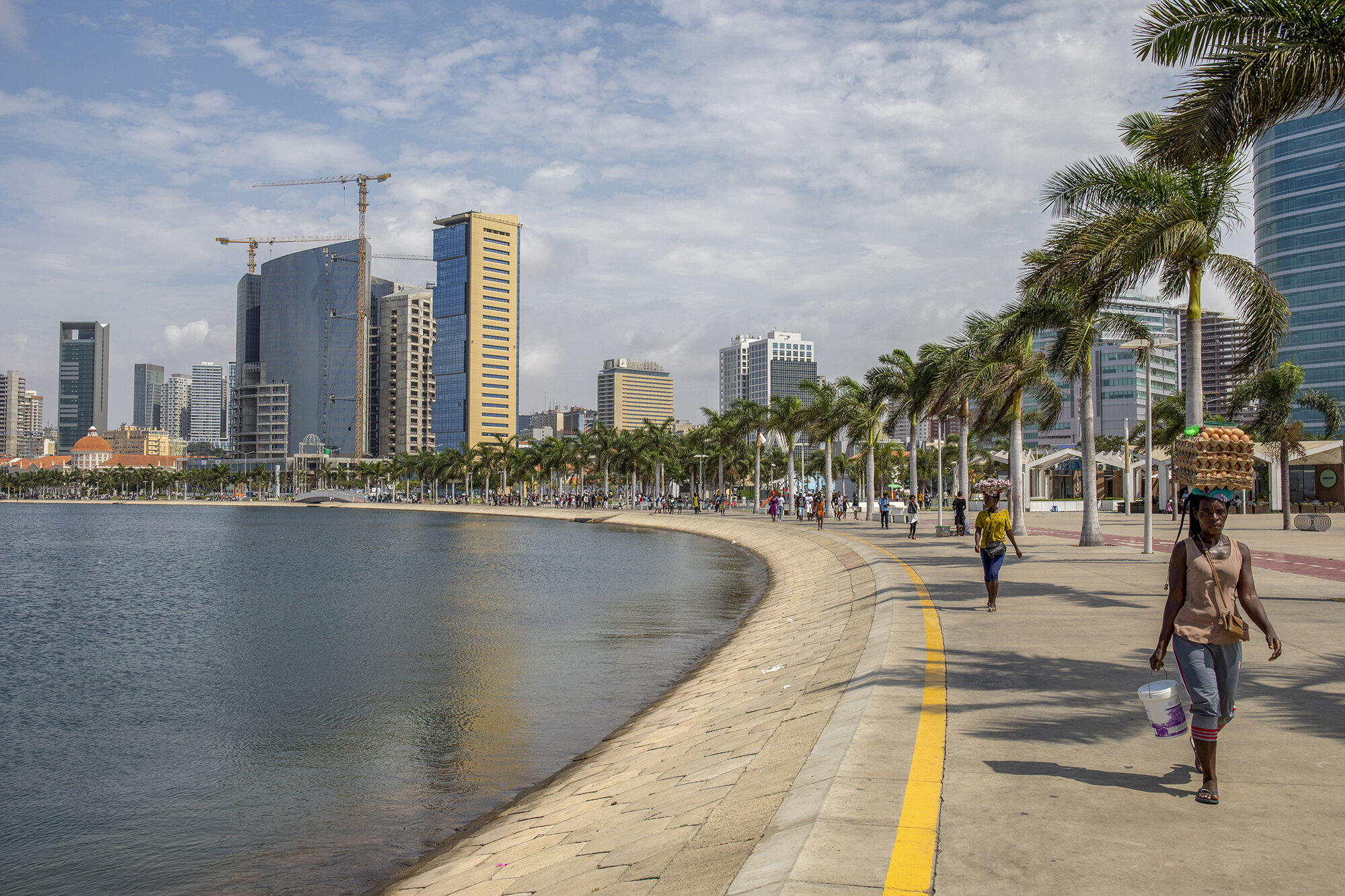
Luanda, Angola. Angola is one of the few countries in Africa where new HIV infections and Aids-related deaths have risen over the past decade. Women account for 66% of the adults living with HIV in Angola, yet they are less likely to be on treatment than men. Girls aged 15-19 are three times as likely to become infected with HIV than boys the same age. - For UNDP
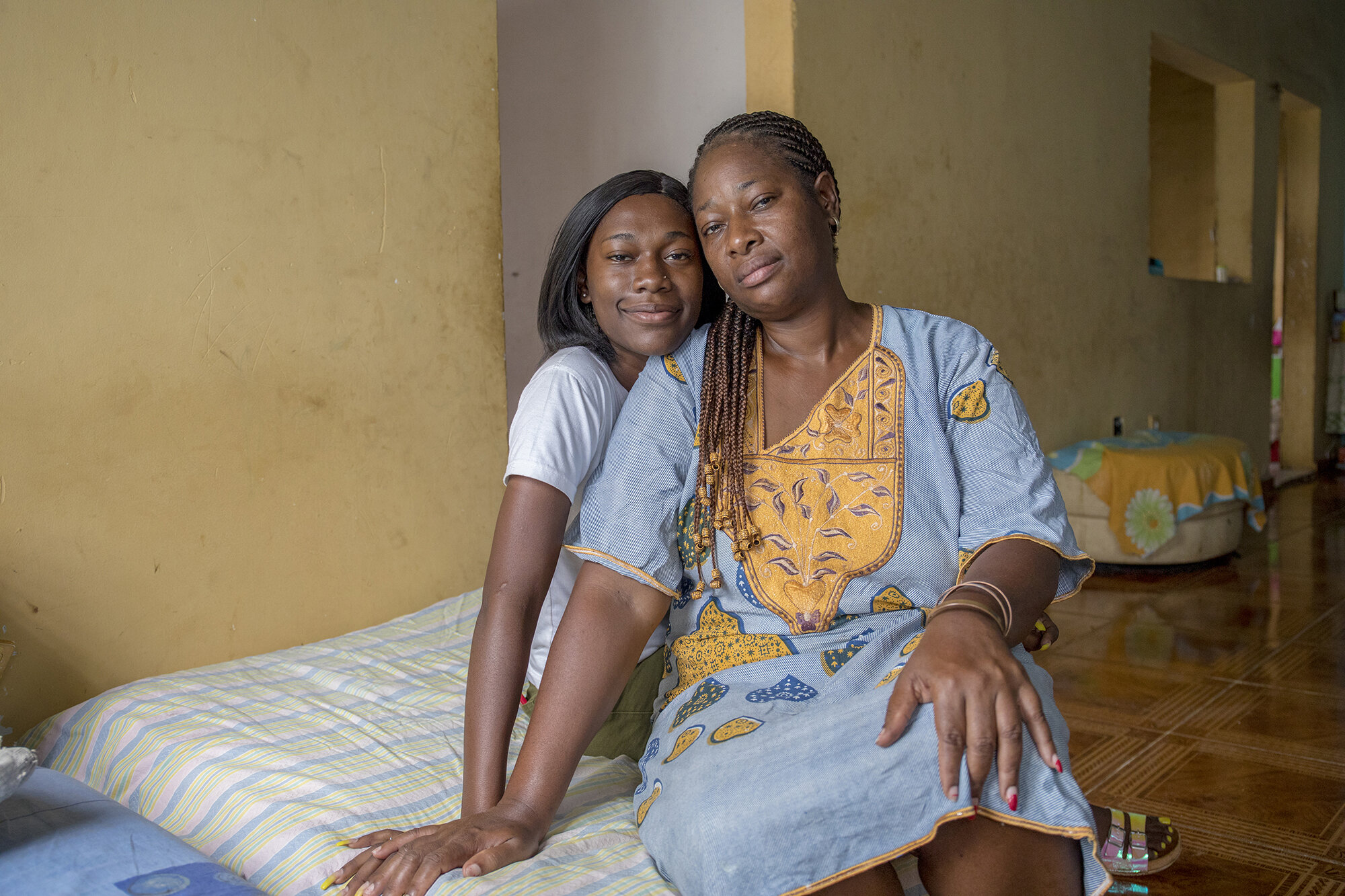
Luanda, Angola. Sónia Ferreira, 40, has been living with HIV for 10 years, but for a long time did not tell anyone. Her daughter, Hwary, 19, has tested negative. Hwary said: ‘I was 14 when I took the test. I was scared but couldn’t show it to my mom. I realised she was terrified and afraid of having infected me. She felt very guilty. I tried to be very optimistic, saying it was nothing, the test was going to be negative. I knew it would go well’ - For UNDP

Cunene, Angola. Teenage girls read a book during a break from a session on reproductive health. The Bancadas femininas say they have now reached more than 33,000 girls and young women, supported by the UN Development Programme, Ajuda de Desenvolvimento de Povo para Povo Angola and the Global Fund to fight Aids, Tuberculosis and Malaria. - For UNDP

Lucia Punungwe, a teacher mentor and math teacher at Kwenda High School gives out school supplies to less privileged local primary-school going pupils. Lucia heads the student council at Kwenda High School. - For CAMFED

Rekina walks to a man-made dam near her home to fetch water for washing her dishes and clothes. The area is rife with informal brick makers, that have created mini-dams in the process of digging sand to make bricks. Because the water is not protected, she accesses water for drinking and cooking at a borehole near her home. - For HIVOS

Rekina arranges harvested Aster Dark Milka flowers in buckets awaiting transportation to the grading shed where they are graded according to height and packed for shipment. - For HIVOS

“Since I started working at the farm, I have never received protective gloves to use when harvesting flowers. We use our bear hands and over time the flowers cut through the skin and leave dye on our hands.” - For HIVOS

Rekina walks home from work. Every day she treks the 8.3-kilometre roundtrip. - For HIVOS

City of Harare staff work on fixing a delapidated borehole in Glen View high density suburb in Harare. Boreholes are the main source of drinking water in the outbreak prone area. - For Médecins Sans Frontières

MSF team members offload pipes to start the process of diagnosing the health of a borehole. Boreholes are the main source of drinking water in the outbreak prone area. - For Médecins Sans Frontières

Back view of the data logging probe being lowered into the borehole. - For Médecins Sans Frontières
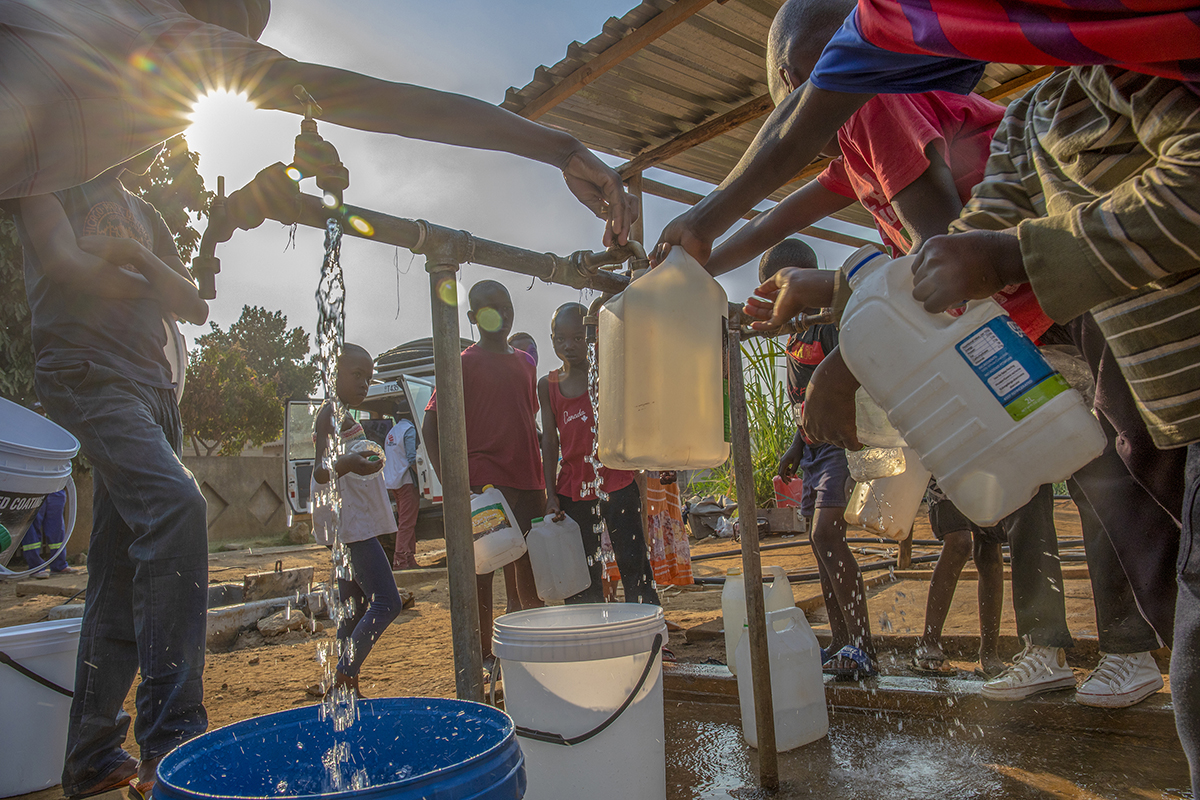
Children access safe, clean water from a community borehole in Budiriro. - For Médecins Sans Frontières

Nurse Mhepo draws blood from a from a pregnant client at Jari Clinic in Chirau, in Zvimba district. - For Crown Agents

Nurse Mhepo takes stock of the drug stocks at Jari Health Clinic in Chirau in Zvimba district. - For Crown Agents

Esther Mwale, a teen connector at Marie Stopes Zambia’s Divine Diva Centre, celebrates with her hockey teammates. - For Marie Stopes International UK
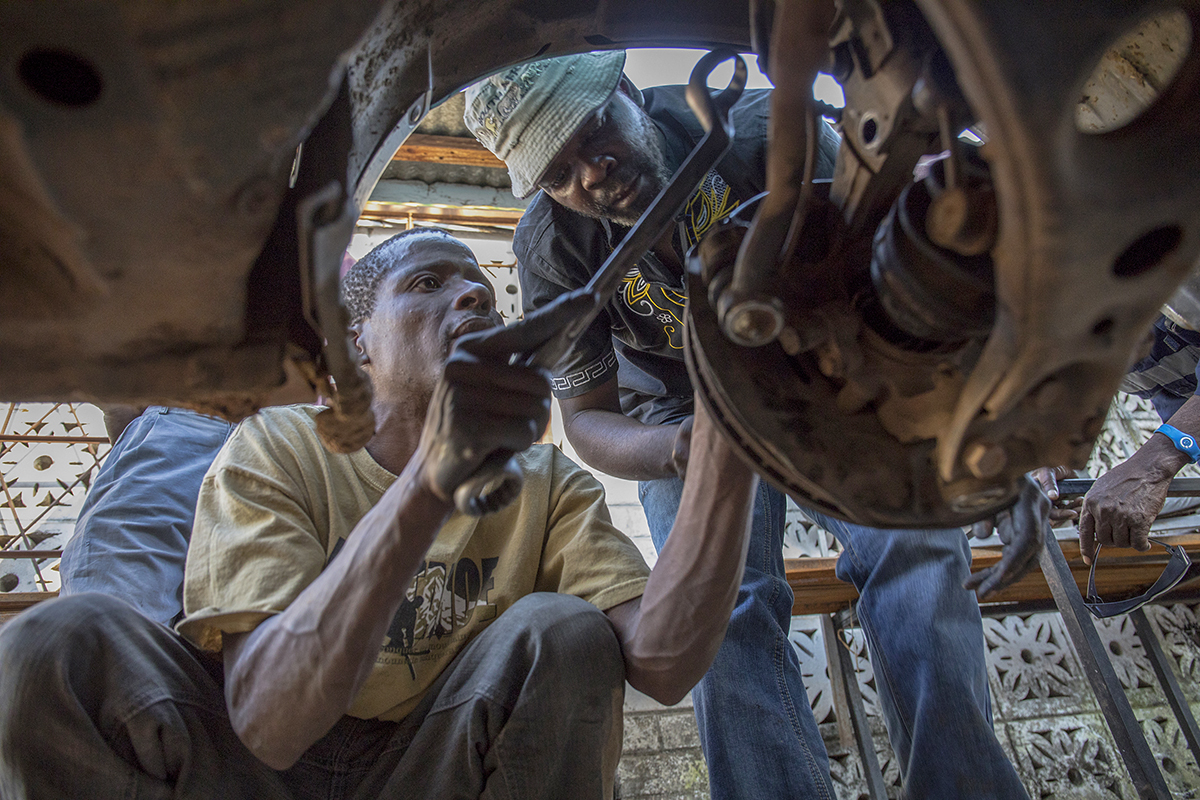
Patmos Masocha, (41) runs a garage in Mashawa with his friend and business partner Witness, who he met when both were in VSO-supported vocational training while serving sentences in Mutimurefu Prison. Here Patmos helps a young intern at his garage to repair a car. - VSO International UK

CeSHHAR outreach worker Tanyaradzwa Gwanzura. According to Tanyaradzwa, the Sisters with A Voice Clinic in Mbare attracts up to 300 new clients a month. - Gates Foundation

Belinda Chikerema, an intern at the Sisters with a Voice Clinic in Mbare, demonstrates how to use a female condom to clients at the clinic on July 6, 2018. The clinic provides primary health care, contraception, management of sexually transmitted infections (STIs), and HIV testing and referral for antiretrovial therapy (ART) to sex workers in Harare. - Gates Foundation

Bathabile Nyathi (27) is a sex worker who joined the trade at the age of 16 and started going to the Sisters with a Voice Clinic in 2009 when she was mocked at a local clinic after having contracted an STI. “The Sisters Clinic are safe spaces for young women who sell sex to find themselves, express themselves and realize their dreams through support without being judged for what they do.” - Gates Foundation

Bathabile Nyathi (27) is a sex worker who joined the trade at the age of 16. At some point in her life she became addicted to drugs and alcohol until she was imprisoned for stabbing a client who had attacked her. “When I was on drugs they (tattoos) were a symbol for loving myself and not giving a f**ck to anyone in the world.” - Gates Foundation

The sun rises over Zimbabwe’s capital city, Harare. - For UNDP

Sarah Zhanet (49) sits for a portrait in her room in Old Mabvuku, in Harare, Zimbabwe. Sarah has been on ART since 2001 and credits her late brother, Peter Joaneti (portrait next to Jesus) for helping her accept her status and seek treatment. - For UNDP

Lloyd Whinya (18) poses for a portrait at an adolescent support centre at Wilkins Hospital in Harare, Zimbabwe. Lloyd is a Community Adolescent Treatment Supporter who helps HIV positive teens make it to their review appointments, offer counselling services and co-ordinates support group meetings. - For UNDP

Melisa Little (30) is a commercial sex worker who has been on ART since she found out about her status in 2015. “With clients who want to have unprotected sex, I tell them that I am on ART and that if they have a family, I don’t want to endanger them.” - For UNDP

Mr Bandawa, a member of Sungano group, chops firewood in preparation of lighting a fire to keep the group's chickens warm overnight in Gokwe South. Sungano group is a 9 member group of people from Bandawa community in Gokwe South who run a chicken project, with support from MeDRa and All We Can, to enable them to earn a living for their families. - For All We Can

Mr Bandawa and Regai, who are members of Sungano group, work together to take care of the group's chickens in Gokwe South. - For All We Can

Regai, a member of Sungano group, cleans the group's chicken coop. - For All We Can

Sungano group members Regai (yellow vest) and Thulani (red t-shirt) chat at a chicken market in Gokwe South, Zimbabwe. - For All We Can

Eugenia Five, a call centre coordinator with Population Services Zimbabwe in her office in Belvedere, Harare. - For Marie Stopes International

Eugenia Five, affectionately known as DJ Loop by her listeners, speaks during one of her weekly radio show programs on SRHR issues at Star FM Zimbabwe. Every week DJ Loop can be heard across the country on Star FM and Radio Zimbabwe giving vital information on family planning. - For Marie Stopes International

Eugenia Five (R), a call centre coordinator with Population Services Zimbabwe, talks to women during a door-to-door community mobilisation exercise in Caledonia outside Harare, Zimbabwe. - For Marie Stopes International

"As I look at the work we are doing as Marie Stopes in the communities, the numbers of women that access our services and we look at the number of maternal morbidity which is decreasing, I believe the hand of Marie Stopes is there because we reaching underserved communities." (Mirriam Simbanegavi) - For Marie Stopes International

Women socialise while waiting to access family planning services at a Marie Stopes International outreach centre at the peri-urban suburb of Epworth in Harare, Zimbabwe. - For Marie Stopes International

Outreach team leader for Mashonaland East, Lovemore Manyemwe, explains how the loop method of contraception works during a group counseling session at Charehwa Clinic in Kagande, Mutoko, Zimbabwe. - For Marie Stopes International

January 10, 2017: MSI Mashonaland East nurse provider Eve Chirengwa (R) speaks to clients during a group counseling session at Mushimbo Clinic in Mutoko, Zimbabwe. - For Marie Stopes International

August 5, 2015: A man on TB treatment shows the medication he used take during a peer educator visit at his home in Mufakosi. - For International Aids Alliance

Lizzy Hofisi tends to her home garden in Zaka District, Ward 4, Masvingo, Zimbabwe. Lizzy and her husband, Robert Hofisi, are beneficiaries of the CARE cash transfer project which has helped them take their 3 children to school. - For CARE International UK
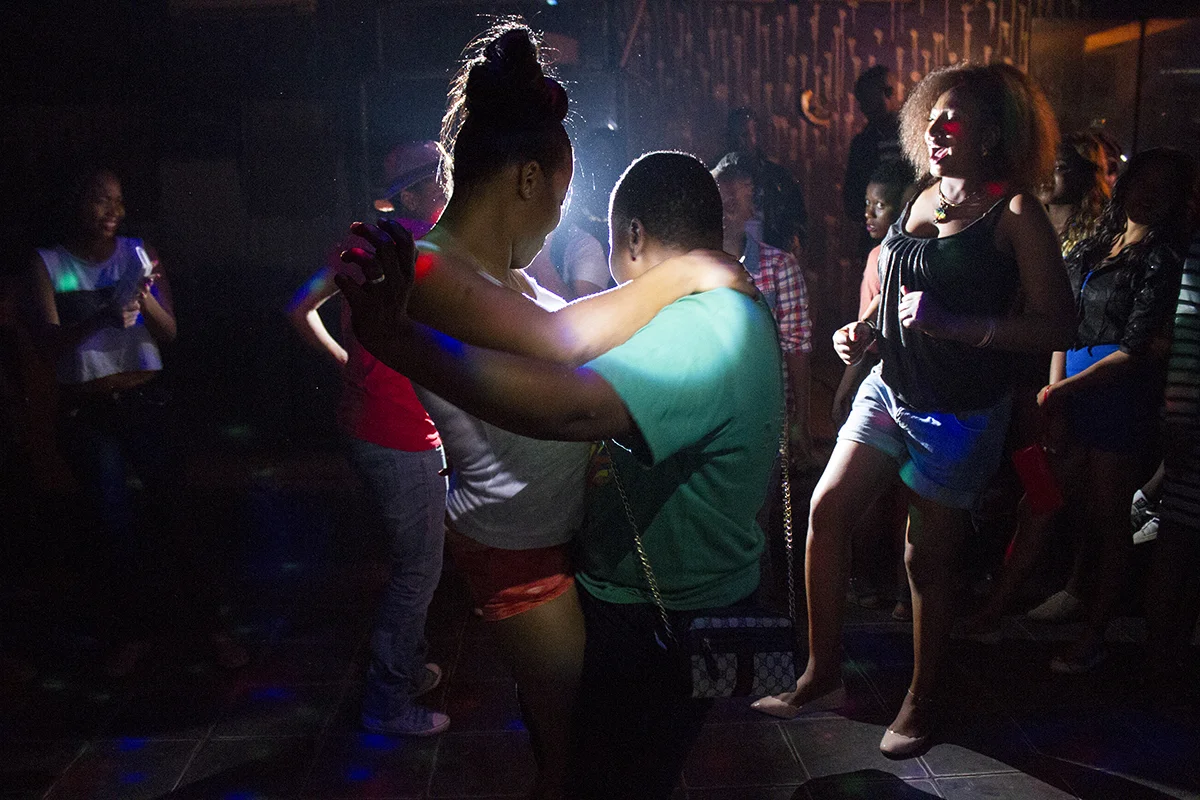
November 11, 2015: Members of the Feminist Action Campaigners (FACers) dance in protest of the curtailing of women's right to self-expression at a local bar in Harare. - For the FACers

Lizzy Hofisi selects peanuts from her home garden in Zaka District, Ward 4, Masvingo, Zimbabwe. Lizzy and her husband, Robert Hofisi, are beneficiaries of the CARE cash transfer project which has helped them take their 3 children to school. - For CARE International UK
























































Clophas Mapfumo (65) goes through an eye refraction conducted by Sister Nevanji, a refractionist for Council for the Blind based in Chiredzi, Zimbabwe. - For Peek Vision
“When I started taking my PrEP, I had an incident in 2020. The incident resulted in me being raped on my way home when I was coming from work, in the evening, by an unknown person. I saw the goodness of PrEP when I gave birth. I birthed my baby who doesn’t have the disease of HIV and AIDS and I myself did not contract the disease of HIV and AIDS. Since then, I am healthy and happy; and my baby is healthy and we are both happy.” - Nashly, sex worker. - For UNDP
Sipiwe and Chipego do dishes at the mother’s shelter in Sikachapa in Kazungula District, Zambia May 2022. - For WaterAid
Elizabeth and Constance share a moment at the arrival of Constance’s new born baby at the clinic in Sikachapa in Kazungula District, Zambia May 2022. - For WaterAid
Sipiwe plates Dorika’s hair at the mother’s shelter at Sikachapa in Kazungula District, Zambia May 2022. - For WaterAid
Community health volunteers check Jean’s weight at her home in Kilimanjaro, Zambia. Besides TB treatment and surveillance community health volunteers often conduct general health checks including HIV testing and BP checks when they visit patients at home. - For USAID
Community health volunteers speak to a woman about TB at her home in Lusaka, Zambia. - For USAID
Mailess speaks to community health volunteers about TB at her home in Kanyama, Lusaka, Zambia. - For USAID
Students around the Chimoyo community in Muzarabani fill out an assessment form before commencing the first day of the Singing to the Lions workshop at Chimoio Primary School, Zimbabwe. Singing to the Lions sessions are done with children to overcoming fear and violence in their lives. This guide is for children and youth aged eight years and older who have experienced or witnessed violence in their family, school or community. - For CAFOD
A volunteer counselor conducts a session during the Singing to the Lions workshop with students from around Chimoyo community in Muzarabani, Zimbabwe. Singing to the Lions sessions are done with children to overcoming fear and violence in their lives. Many of the participants who will take part in this workshop have experienced multiple traumas – the death of parents; military conflict; domestic violence; sexual, emotional and physical abuse; and child labor. - For CAFOD
October 28, 2021: Bitumen World workers rehabilitate Seke Road in Harare, Zimbabwe. - For IMF
September 23, 2021: People go about their business in Mbare Musika, Harare. - For IMF
Chitenderano, Nyazura, Zimbabwe - December 20, 2019: Food assistance packs ready for distribution at Chitenderano distribution point in Nyazura, in Makoni District. Zimbabwe is currently facing a severe drought caused by poor rainfall that affected harvests in 2019. The lean season assistance programme will see 49 000 food insecure people being assisted in the district. - For ActionA!d
Chitenderano, Nyazura, Zimbabwe - December 21, 2019: Community members gather to share food assistance packs amongst themselves at Chitenderano distribution point in Nyazura, in Makoni District. Zimbabwe is currently facing a severe drought caused by poor rainfall that affected harvests in 2019. The lean season assistance programme will see 49 000 food insecure people being assisted in the district.
- For ActionA!d
Chitenderano, Nyazura, Zimbabwe - December 21, 2019: Women walk home after receiving food assistance packs at Chitenderano distribution point in Nyazura, in Makoni District. Zimbabwe is currently facing a severe drought caused by poor rainfall that affected harvests in 2019. The lean season assistance programme will see 49 000 food insecure people being assisted in the district. - For ActionA!d
Chitenderano, Nyazura, Zimbabwe - December 21, 2019: Men redirect an ox-drawn cart with food assistance packs as women make their way home after receiving food at Chitenderano distribution point in Nyazura, in Makoni District. Zimbabwe is currently facing a severe drought caused by poor rainfall that affected harvests in 2019. The lean season assistance programme will see 49 000 food insecure people being assisted in the district. - For ActionA!d
Sifiso in her field in Matobo, in Zimbabwe’s Matabeleland South province where she lives with her husband and 6 of her 7 children. She has been farming since 1973 supporting her family. - For Oxfam GB
Luanda, Angola. Angola is one of the few countries in Africa where new HIV infections and Aids-related deaths have risen over the past decade. Women account for 66% of the adults living with HIV in Angola, yet they are less likely to be on treatment than men. Girls aged 15-19 are three times as likely to become infected with HIV than boys the same age. - For UNDP
Luanda, Angola. Sónia Ferreira, 40, has been living with HIV for 10 years, but for a long time did not tell anyone. Her daughter, Hwary, 19, has tested negative. Hwary said: ‘I was 14 when I took the test. I was scared but couldn’t show it to my mom. I realised she was terrified and afraid of having infected me. She felt very guilty. I tried to be very optimistic, saying it was nothing, the test was going to be negative. I knew it would go well’ - For UNDP
Cunene, Angola. Teenage girls read a book during a break from a session on reproductive health. The Bancadas femininas say they have now reached more than 33,000 girls and young women, supported by the UN Development Programme, Ajuda de Desenvolvimento de Povo para Povo Angola and the Global Fund to fight Aids, Tuberculosis and Malaria. - For UNDP
Lucia Punungwe, a teacher mentor and math teacher at Kwenda High School gives out school supplies to less privileged local primary-school going pupils. Lucia heads the student council at Kwenda High School. - For CAMFED
Rekina walks to a man-made dam near her home to fetch water for washing her dishes and clothes. The area is rife with informal brick makers, that have created mini-dams in the process of digging sand to make bricks. Because the water is not protected, she accesses water for drinking and cooking at a borehole near her home. - For HIVOS
Rekina arranges harvested Aster Dark Milka flowers in buckets awaiting transportation to the grading shed where they are graded according to height and packed for shipment. - For HIVOS
“Since I started working at the farm, I have never received protective gloves to use when harvesting flowers. We use our bear hands and over time the flowers cut through the skin and leave dye on our hands.” - For HIVOS
Rekina walks home from work. Every day she treks the 8.3-kilometre roundtrip. - For HIVOS
City of Harare staff work on fixing a delapidated borehole in Glen View high density suburb in Harare. Boreholes are the main source of drinking water in the outbreak prone area. - For Médecins Sans Frontières
MSF team members offload pipes to start the process of diagnosing the health of a borehole. Boreholes are the main source of drinking water in the outbreak prone area. - For Médecins Sans Frontières
Back view of the data logging probe being lowered into the borehole. - For Médecins Sans Frontières
Children access safe, clean water from a community borehole in Budiriro. - For Médecins Sans Frontières
Nurse Mhepo draws blood from a from a pregnant client at Jari Clinic in Chirau, in Zvimba district. - For Crown Agents
Nurse Mhepo takes stock of the drug stocks at Jari Health Clinic in Chirau in Zvimba district. - For Crown Agents
Esther Mwale, a teen connector at Marie Stopes Zambia’s Divine Diva Centre, celebrates with her hockey teammates. - For Marie Stopes International UK
Patmos Masocha, (41) runs a garage in Mashawa with his friend and business partner Witness, who he met when both were in VSO-supported vocational training while serving sentences in Mutimurefu Prison. Here Patmos helps a young intern at his garage to repair a car. - VSO International UK
CeSHHAR outreach worker Tanyaradzwa Gwanzura. According to Tanyaradzwa, the Sisters with A Voice Clinic in Mbare attracts up to 300 new clients a month. - Gates Foundation
Belinda Chikerema, an intern at the Sisters with a Voice Clinic in Mbare, demonstrates how to use a female condom to clients at the clinic on July 6, 2018. The clinic provides primary health care, contraception, management of sexually transmitted infections (STIs), and HIV testing and referral for antiretrovial therapy (ART) to sex workers in Harare. - Gates Foundation
Bathabile Nyathi (27) is a sex worker who joined the trade at the age of 16 and started going to the Sisters with a Voice Clinic in 2009 when she was mocked at a local clinic after having contracted an STI. “The Sisters Clinic are safe spaces for young women who sell sex to find themselves, express themselves and realize their dreams through support without being judged for what they do.” - Gates Foundation
Bathabile Nyathi (27) is a sex worker who joined the trade at the age of 16. At some point in her life she became addicted to drugs and alcohol until she was imprisoned for stabbing a client who had attacked her. “When I was on drugs they (tattoos) were a symbol for loving myself and not giving a f**ck to anyone in the world.” - Gates Foundation
The sun rises over Zimbabwe’s capital city, Harare. - For UNDP
Sarah Zhanet (49) sits for a portrait in her room in Old Mabvuku, in Harare, Zimbabwe. Sarah has been on ART since 2001 and credits her late brother, Peter Joaneti (portrait next to Jesus) for helping her accept her status and seek treatment. - For UNDP
Lloyd Whinya (18) poses for a portrait at an adolescent support centre at Wilkins Hospital in Harare, Zimbabwe. Lloyd is a Community Adolescent Treatment Supporter who helps HIV positive teens make it to their review appointments, offer counselling services and co-ordinates support group meetings. - For UNDP
Melisa Little (30) is a commercial sex worker who has been on ART since she found out about her status in 2015. “With clients who want to have unprotected sex, I tell them that I am on ART and that if they have a family, I don’t want to endanger them.” - For UNDP
Mr Bandawa, a member of Sungano group, chops firewood in preparation of lighting a fire to keep the group's chickens warm overnight in Gokwe South. Sungano group is a 9 member group of people from Bandawa community in Gokwe South who run a chicken project, with support from MeDRa and All We Can, to enable them to earn a living for their families. - For All We Can
Mr Bandawa and Regai, who are members of Sungano group, work together to take care of the group's chickens in Gokwe South. - For All We Can
Regai, a member of Sungano group, cleans the group's chicken coop. - For All We Can
Sungano group members Regai (yellow vest) and Thulani (red t-shirt) chat at a chicken market in Gokwe South, Zimbabwe. - For All We Can
Eugenia Five, a call centre coordinator with Population Services Zimbabwe in her office in Belvedere, Harare. - For Marie Stopes International
Eugenia Five, affectionately known as DJ Loop by her listeners, speaks during one of her weekly radio show programs on SRHR issues at Star FM Zimbabwe. Every week DJ Loop can be heard across the country on Star FM and Radio Zimbabwe giving vital information on family planning. - For Marie Stopes International
Eugenia Five (R), a call centre coordinator with Population Services Zimbabwe, talks to women during a door-to-door community mobilisation exercise in Caledonia outside Harare, Zimbabwe. - For Marie Stopes International
"As I look at the work we are doing as Marie Stopes in the communities, the numbers of women that access our services and we look at the number of maternal morbidity which is decreasing, I believe the hand of Marie Stopes is there because we reaching underserved communities." (Mirriam Simbanegavi) - For Marie Stopes International
Women socialise while waiting to access family planning services at a Marie Stopes International outreach centre at the peri-urban suburb of Epworth in Harare, Zimbabwe. - For Marie Stopes International
Outreach team leader for Mashonaland East, Lovemore Manyemwe, explains how the loop method of contraception works during a group counseling session at Charehwa Clinic in Kagande, Mutoko, Zimbabwe. - For Marie Stopes International
January 10, 2017: MSI Mashonaland East nurse provider Eve Chirengwa (R) speaks to clients during a group counseling session at Mushimbo Clinic in Mutoko, Zimbabwe. - For Marie Stopes International
August 5, 2015: A man on TB treatment shows the medication he used take during a peer educator visit at his home in Mufakosi. - For International Aids Alliance
Lizzy Hofisi tends to her home garden in Zaka District, Ward 4, Masvingo, Zimbabwe. Lizzy and her husband, Robert Hofisi, are beneficiaries of the CARE cash transfer project which has helped them take their 3 children to school. - For CARE International UK
November 11, 2015: Members of the Feminist Action Campaigners (FACers) dance in protest of the curtailing of women's right to self-expression at a local bar in Harare. - For the FACers
Lizzy Hofisi selects peanuts from her home garden in Zaka District, Ward 4, Masvingo, Zimbabwe. Lizzy and her husband, Robert Hofisi, are beneficiaries of the CARE cash transfer project which has helped them take their 3 children to school. - For CARE International UK